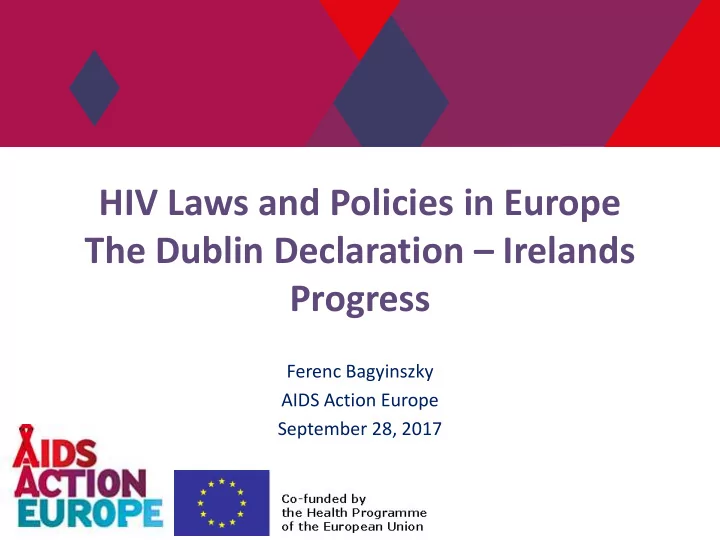

HIV Laws and Policies in Europe The Dublin Declaration – Irelands Progress Ferenc Bagyinszky AIDS Action Europe September 28, 2017
• HIV policies in Europe – the Dublin Declaration • Monitoring of implementation • Ireland´s progress • Updating the declaration
AIDS Action Europe • A pan-European network of 440 organizations since 2004 • Based in Berlin, hosted by Deutsche AIDS-Hilfe • Governed by a Steering Committee • “AAE’s mission is to strengthen civil society to work towards a more effective response to the HIV/AIDS, TB and viral hepatitis epidemics in Europe and Central Asia. We are striving for the best standards of human rights protection and universal access to prevention, treatment, care and support, tackling health inequalities and focusing on key affected populations.” • Advocacy for HIV policy change – EU HIV/AIDS, Hepatitis and TB Civil Society Forum – NGO Delegation to the UNAIDS PCB • Platform for information and knowledge sharing and exchange – HIV/AIDS Clearinghouse • Project work on key issues: affordability, CBVCT, gay men and other MSM, European HIV Legal Forum (migrants in irregular situation), criminalization
HIV policies in Europe – the Dublin Declaration 2004 • Leadership • Prevention • Living with HIV • Partnership • Follow-up
Leadership • Accountable leadership at all level • National HIV/AIDS partnerships • National HIV/AIDS plans • Active involvement of EU institutions • International support (GFATM)
Prevention • Access to information and HIV-education for young people (90%) • Access to prevention programmes for key populations (80%) • Scaling up harm reduction services • Elimination of HIV infection among children • Universal access to SRHR services • STI prevalence and incidence control • Improve surveillance systems • Commitment to research: vaccine, microbicides
Living with HIV • Combating stigma and discrimination – review of legislation and policies – criminalization – access to services and care programmes • Universal access to effective, affordable and equitable prevention, treatment and care • Affordability – TRIPS flexibility and compulsory licensing • Monitoring best practices on services
Partnership • Partnership at all level: – Among countries – Involvement of civil society, faith-based organizations, PLHIV and other key populations in development and implementation of strategies and plans – Cooperation with the private sector – Involvement of pharmaceutical industry – Coordination between donors, multinational organization, government, civil society – Partnership with media – Support regional cooperation and networking of PLHIV organizations and other civil society actors
Follow up: Progress report – monitoring implementation of the Dublin Declaration • Close monitoring of progress • European Centre for Disease Prevention and Control (ECDC) – biannual progress report and thematic reports • Make sure your country reports – check what they report
What is new since 2004? • Swiss Statement 2008 – Treatment as prevention (TasP) – PARTNER study – U=U • WHO guidelines on Post-Exposure Prophylaxis – PEP for all cases • Pre-Exposure Prophylaxis • START study – WHO Test and treat guidelines • 90-90-90 UNAIDS targets
How is Ireland doing? • Prevention – funding and availability • Criminalization of drug use
How is Ireland doing? • PrEP Test and treat
Concluding thoughts • Keeping each other accountable • Removing legal and social barriers to accessing services • Funding and sustainability – allocation of funds • Cooperation – intersectional and international/regional
Thank you for your attention! www.aidsactioneurope.org www.hivaidsclearinghouse.eu
Recommend
More recommend